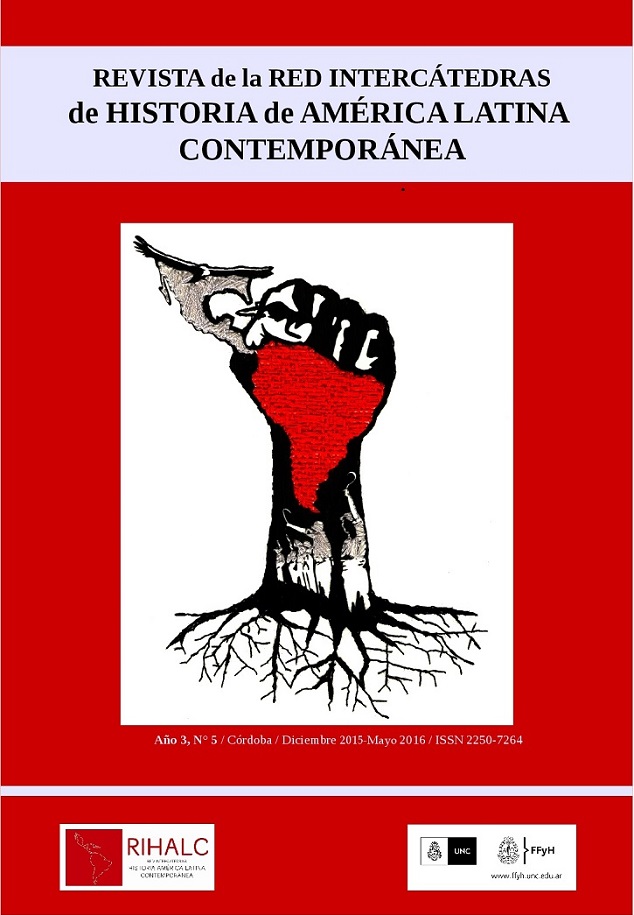Reorganizing genocide in Paraguay
Keywords:
Paraguay, Ligas Agrarias, genocidioAbstract
Despite their specificities, the Paraguayan case represents a key element for the study of the genocidal processes in the region. Appointed early in the Doctrine of National Security, General Alfredo Stroessner and the ruling class that supported his government made use of entrenched conceptions in the community throughout its history to create a negative figure to justify the persecution, expropriation and destruction of anyone who opposed the regime. The figure of foreign communist allowed the perpetration of a plan headed by the police and military forces, based on the counterinsurgency doctrine. To develop what was known as conservative modernization in the late 60s, that figure served to undermine any attempt to subvert the new model of accumulation. Thus, the Christian Agrarian Leagues were intensely hunted to be eliminated both organizationally and physically. This work intends to analyze, from the concept of reorganizing genocide of Daniel Feierstein (2014), the Paraguayan case, under the assumption that the physical elimination of farmers as well as the informers scattered within the whole society, were intended to eliminate the relations of reciprocity and autonomy that prevent from the implementation of a new economic pattern.References
Ansaldi, Waldo y Giordano, Verónica (2012): América Latina, la construcción del orden. Tomo II. De las sociedades de masa a las sociedades en proceso de construcción, Ariel, Buenos Aires.
Comisión Verdad y Justicia (2008a): El autoritarismo en la historia reciente de Paraguay, Ministerio de Educación y Cultura, Asunción. Disponible en http://www.verdadyjusticiadp.gov.py/documentos/documento.php?h=efc4707bf5a5ad33cfeb8fb1b9bedb3e
______________________ (2008b): Informe Final–Anivehaguáoiko, tomo 1. Asunción. Disponible en: http://www.verdadyjusticia-dp.gov.py/documentos.html
______________________ (2008c): Informe Final–Anivehaguáoiko, tomo 2. Asunción. Disponible en: http://www.verdadyjusticia-dp.gov.py/documentos.html
Deligdisch, Adriana (1999): El stronismo desde la óptica del diario Patria 1954-1989, Tesis de licenciatura, Universidad Católica Nuestra Señora de la Asunción, Facultad de Filosofía y Ciencias Humanas, Asunción.
Feierstein, Daniel (2014): El genocidio como práctica social. Entre el nazismo y la experiencia argentina, Fondo de Cultura Económica, Buenos Aires.
Formento, Liliana Isabel (2003): El Paraguay Campesino: Una vieja historia de resistencia, adaptación y funcionalidad, Universidad Nacional de Rio Cuarto, Córdoba.
Foucault, Michel, (2008): Genealogía del Racismo, Altamira, Buenos Aires.
Levy, Guillermo y Borovinsky, Tomás (2005): “Apuntes sobre novedad y articulación. El nazismo y el genocidio nazi”, en Daniel Feierstein (ed.), Genocidio, la administración de la muerte en la modernidad, EDUNTREF, Buenos Aires, pp. 145-170.
Palau Viladesau, Tomás (2010): “La política y su trasfondo. ¿El poder real en Paraguay?”, Nueva Sociedad, Nº 229, pp. 134-150
Soler, Lorena (2012): Paraguay, la larga invención del golpe. El stronismo y el orden político en Paraguay, Imago Mundi, Buenos Aires.
Soler, Lorena; Elías, Rodolfo y Portillo, Ana (2015): “El régimen stronista y su incidencia en la configuración y las prácticas escolares 1954-1970”, Cuadernos Chilenos de Historia de la Educación Dossier: Educación y dictaduras en el Cono Sur, Año 3, N° 4, pp.10-33.
Terribile, Marcelo (2010): Aproximaciones al modelo de Ligas Agrarias Cristianas en la lucha campesina en el Paraguay (1960-1980), Observatorio Latinoamericano, N° 2, pp. 109-114.
Winer, Sonia (2015): Doctrina de inseguridad Mundial. Paraguay como laboratorio de Estados Unidos en la región, Prometeo, Buenos Aires.
Downloads
Published
Issue
Section
License
Aquellos autores/as que tengan publicaciones con esta revista, aceptan los términos siguientes:
- Los autores/as conservarán sus derechos de autor y garantizarán a la revista el derecho de primera publicación de su obra, el cuál estará simultáneamente sujeto a la Licencia de reconocimiento de Creative Commons que permite la libre distribución con mención de su(s) creadores, no permite el uso comercial ni las obras derivadas. Los autores, al enviar el artículo, acuerdan publicarlo bajo esta licencia..
- Los autores/as podrán adoptar otros acuerdos de licencia no exclusiva de distribución de la versión de la obra publicada (p. ej.: depositarla en un archivo telemático institucional o publicarla en un volumen monográfico) siempre que se indique la publicación inicial en esta revista.
- Se permite y recomienda a los autores/as difundir su obra a través de Internet (p. ej.: en archivos telemáticos institucionales o en su página web) después del proceso de publicación.



